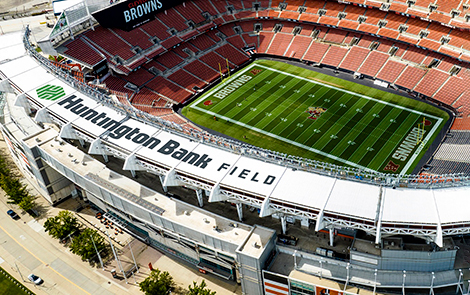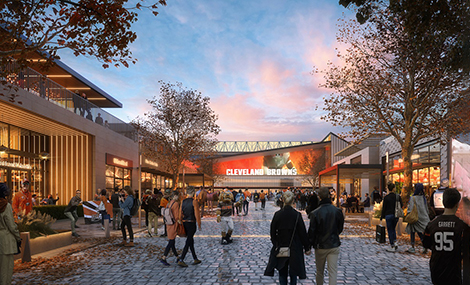The article is published as part of an exclusive content-sharing agreement with neo-trans.blog.
Support for the planned domed stadium in Brook Park by the Greater Cleveland Partnership (GCP), announced earlier this week, has ruffled a few feathers. And it’s not just those that were expected to be ruffled — Cuyahoga County and City of Cleveland officials, Downtown Cleveland Inc., and others. Now, it’s the parent company of the Cleveland Cavaliers who say pursuing the stadium at this time is a bad idea.
A critical two-page letter dated May 21 was addressed to GCP board offices and executive committee on letterhead bearing the logos of the National Basketball Association franchise Cavs and its parent Rock Entertainment Group along with the Cleveland Monsters minor-league hockey, Cleveland Charge minor-league basketball, Cavs Legion Gaming Club esports franchise and Rock Entertainment Sports Network.
The letter, sent anonymously to NEOtrans, criticizes the GCP executive committee’s endorsement of the Brook Park stadium. It said the endorsement puts “at risk” a proposed voter-approved updating of the countywide excise tax on alcohol and tobacco products, dubbed the sin tax, by “obscuring” its purpose. Two anonymous sources also told NEOtrans that the endorsement vote by GCP was contentious and close.
“Given all of this, we are left with the unshakable impression that the interests of all GCP members are not equal, which belies the basic principles of partnership,” the letter states. GCP is the Cleveland metro area’s chamber of commerce.

The sin tax was passed by county voters in 1990 to build and maintain the Gateway sports and entertainment complex, home of the Cavs, Monsters and Cleveland Guardians baseball. Voters extended the tax in 1995 to help build and maintain a stadium for the Cleveland Browns on the downtown lakefront. It was extended again in 2014 to expire in 2034. The sin tax raises about $14 million per year.
The letter expressed concern that the sin tax needed to be increased or “modernized” because Cleveland’s existing sports facilities “are forced to rely on 1990 dollars to pay for 2025 expenses.” Under consideration is a 10-year extension of the sin tax and increasing the tax on cigarettes from 50 cents a pack to $1.50 plus increasing the cost of a beer by about 5 cents.
“To be clear these activities have been as transparent and inviting as possible to ensure the inclusion of all interested parties, while allowing for flexibility and thoughtful collaboration,” yesterday’s letter said. “We have worked hard to build consensus through a vision of mutual benefit rather than through pressure. Our approach was working. Policymakers locally and in Columbus acknowledged the value of our work and indicated support for allowing the people of Cuyahoga County to determine whether the sin tax should be updated to account for today’s costs.”
However the letter is cut off at the bottom so it is not clear who wrote or signed it. NEOtrans has reached out to the Cavs and Rock Entertainment for verification and comment but has yet to hear back from them. Based on input from other sources, NEOtrans is confident the letter is legitimate.

Serving on the GCP board’s executive committee is Nic Barlage, CEO and president of the Rock Family of Companies along with Dee Haslam, CEO of Haslam Sports Group (HSG), owners of the Browns. The chairman of the GCP board is Paul Dolan, owner and CEO of the Cleveland Guardians. Haslam reportedly abstained from the GCP vote about HSG’s Brook Park stadium, but has used her influence on the board in at least one prior communication.
NEOtrans also reached out to GCP and to HSG which is seeking the $2.4 billion Brook Park stadium, half of which would be taxpayer-supported, for Browns home football games and other events. And we contacted the Guardians for comment, too. None responded prior to publication of this article.
Cuyahoga County Executive Chris Ronayne said neither the sin tax nor any other countywide funds will be used to fund the Brook Park stadium. HSG said it is no longer counting on county support of its stadium capital funding stack.
The apparent Rock Entertainment communication follows NEOtrans’ report yesterday of a poll conducted May 12-18 of likely Cuyahoga County voters. It said that 61 percent of voters opposed the Browns move and that their support for extending or expanding the sin tax would decrease if it is used to help fund construction of the Brook Park stadium.
It was not revealed who commissioned that poll by EMC Research of Columbus, but its findings align not just with recurring statements made by Cuyahoga County officials. They also align with concerns expressed in the letter that apparently came from Rock Entertainment which decried the sin tax’s inability to keep up with facility expenses it was originally intended to cover.

“Despite months of work toward achieving a solution that could accommodate venue needs well into the future, it has recently become clear that this positive momentum is at risk,” the letter stated.
“The optimism conveyed in GCP’s ‘World-class stadiums and world-class waterfronts’ statement obscures the complex political considerations involved with the Cleveland Browns’ planned move to Brook Park and silences the impact of these considerations on the public-private efforts to modernize the sin tax,” the letter said.
The letter continued, “We believe, based on our engagement locally, that a sin tax modernization effort which is intertwined with the Brook Park plan and strips local control from the decision-making process, undoing decades of precedent, is doomed to fail — leaving all worse off.”
“Merging the issues of the future home of the Browns (which we have been and will remain neutral on) with the sin tax is not only problematic, because it imperils are fundamentally ability to modernize the sin tax through a ballot initiative, but also because (i) there is a clear lack of consensus among members on the issue, and (ii) a comprehensive and transparent discussion of the issues has not occurred with either the executive committee or the broader board,” the letter added.
The GCP endorsement of the Brook Park stadium was met with strong reactions outside of the GCP board, too. The reason is that if the Brook Park stadium is built, Browns home games and much of the hospitality business associated with it would no longer be concentrated downtown, but the extent has been debated. The team’s lease expires at the city-owned, 1999-built downtown lakefront stadium following the 2028 football season.
“Downtowns are the lifeblood of regional economies, and building a strong, resilient downtown requires sustained collaboration among public, private and civic partners,” said Downtown Cleveland Inc. in a written statement. “The Browns moving to Brook Park jeopardizes the momentum we have built as a downtown.”
Cleveland Mayor Justin Bibb and county Executive Ronayne said in a joint letter yesterday that the GCP endorsement of Brook Park was an “affront to any partnership we have had together” and announced they will suspend their involvement with any GCP-led activities.
For more updates about Cleveland, sign up for our Cleveland Magazine Daily newsletter, delivered to your inbox six times a week.
Cleveland Magazine is also available in print, publishing 12 times a year with immersive features, helpful guides and beautiful photography and design.




